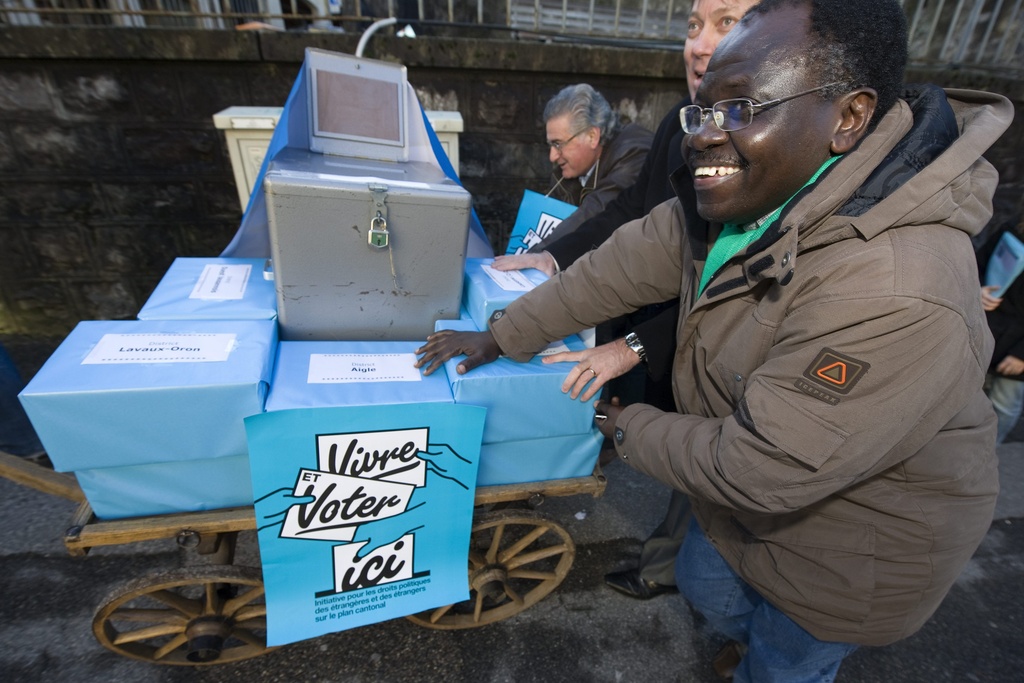
Bern and Basel to decide on vote for foreigners

Foreigners living in French-speaking Switzerland are able to take part in votes and elections in their commune and sometimes also at the cantonal level.
In the German-speaking part of the country, this is largely only possible once Swiss citizenship has been obtained. On September 26, Bern and Basel will decide on whether to follow the Swiss-French lead and allow foreigners the vote.
With the exception of Valais, all the western Swiss cantons have introduced voting rights for foreigners. Neuchâtel and Jura accorded foreigners voting rights from the time of their creation, in 1848 and 1978 respectively.
In both these cantons, foreigners can cast ballots in communal and cantonal votes as well as elections.
Canton Fribourg, on the other hand, introduced the right as part of a reform of the constitution. Geneva and Vaud brought it in following successful people’s initiatives.
In German-speaking Switzerland, communes in Appenzell Outer Rhodes, Graubünden and Basel City have the option of introducing foreigner voting but only a handful have done it.
In total only eight out of the 26 cantons offer some form of voting rights to non-Swiss residents. But the issue has not been discussed at a national level.
Experts explain the different attitudes of French- and German-speaking Switzerland as reflecting different understandings of the role of the state. In western Switzerland the “French, Republican model” prevails, according to Thomas Facchinetti, in charge of foreigners’ issues in canton Neuchâtel.
This model is based on the principle that citizens who have duties, should also have rights. “In German-speaking Switzerland, people are more oriented towards Germany, where the model of ethnicity and being part of a nation prevails,” said Facchinetti in an interview with swissinfo.ch a few years ago.
Communes decide
On September 26, voters in two cantons – Bern and Basel City – will decide on separate people’s initiatives. The Bern initiative wants to allow communes to introduce voting rights for foreigners. But they would be barred from standing for political office or voting in cantonal ballots or elections.
And only foreigners who had lived in Switzerland for at least ten years – five of these in Bern – would be eligible.
Despite the limitations of the initiative, resistance in the canton is running high. Most centre-right and rightwing parties oppose it, arguing that voting rights should be linked to citizenship.
“When a foreigner obtains citizenship, he or she also obtains voting rights. A halfway house, whereby some communes give foreigners the vote and others don’t, creates confusion,” Dieter Widmer of the Conservative Democratic Party told the Bund newspaper.
Other centre-right parties argue that cities like Bern or Biel would quickly introduce voting rights thereby putting pressure on the other communes.
United behind the initiative are the centre-left parties, including the Greens. They argue that foreigners pay tax, shoulder responsibilities and contribute towards economic development, so they should also be given a say when a village wants to build a new gymnasium or revise its planning regulations.
Language problems
In Basel, some centre-right politicians also back voting rights for foreigners.
The initiative being voted on there wants to enfranchise foreigners who have lived in Basel for five years to take part in cantonal ballots. A counter-proposal by the local government and parliament calls for the Swiss residency requirement to be increased to ten years, of which five have been spent in Basel.
Opponents argue that many immigrants have inadequate knowledge of a national language. “After five years, very few immigrants can speak German properly, and it is still a problem after ten years,” said Christoph Bürgenmeier, the president of the local Liberal Party.
Supporters counter this argument by pointing out that the 3,360 Germans living in Basel City have a very good mastery of German. They add that extending voting rights to foreigners would promote integration.
Catholic theologian Xaver Pfister backs the right of foreigners to vote. He represents a religion whose adherents were for a long time disenfranchised. Catholic (men) in Basel got the vote 50 years after it was introduced for Protestants.
“The denial of fundamental democratic rights creates parallel societies and this mentality has a long-lasting impact,” he said.
The 1992 Maastricht treaty sets out the right of EU citizens who live in an EU country other than their own to vote in local and European elections.
The new European constitution underlines this principle.
Individual EU members deal with the issue of voting rights for non-EU citizens in very different ways.
Some countries, including Portugal, only accord voting rights to people from countries with reciprocal agreements.
Switzerland is not a member of the EU.
(adapted from German by Morven McLean)

In compliance with the JTI standards
More: SWI swissinfo.ch certified by the Journalism Trust Initiative



























You can find an overview of ongoing debates with our journalists here . Please join us!
If you want to start a conversation about a topic raised in this article or want to report factual errors, email us at english@swissinfo.ch.